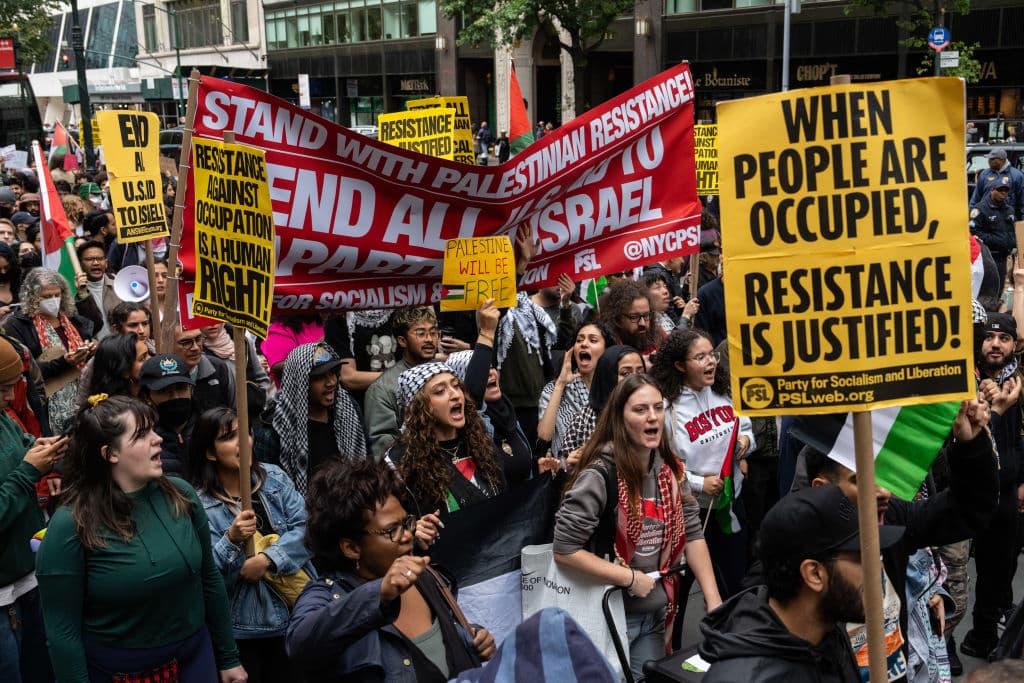Mayor Adams Could Help Reverse Surge in Hate Crimes by More Clearly Defining Antisemitism
Since October 7, the city has been roiled by a wave of anti-Jewish incidents, and adopting the International Holocaust Remembrance Alliance’s working definition of antisemitism would go a ways toward curtailing this trend.

Since October 7, 2023, antisemitic hate crimes have risen steeply in New York City, with incidents occurring nearly every day. This month, for example, a man in the Bronx was charged with attempting to kill his Jewish barber over his hatred for Israel, and, last month, a man yelled “Free Palestine” before stabbing a Jewish man on a Brooklyn sidewalk. Anti-Israel protesters have targeted Jewish people, vandalized their homes, and taunted them at a kosher deli about recently murdered American Israeli hostage, Hersh Polin-Goldberg.
It’s time for things to change.
New York’s wave of antisemitic crime is an example of what happens when a society fails to accept that anti-Zionism is a form of antisemitism. Mayor Adams could radically curtail this terrifying trend by adopting the International Holocaust Remembrance Alliance’s working definition of antisemitism. This would enable his police force, prosecutors, schools, and workforce management to identify this hateful behavior as antisemitic. So, why hasn’t he done it yet? And what is IHRA?
The IHRA definition was drafted after the Swedish prime minister, Göran Persson, took a trip to a German concentration camp and, appalled by what he saw, formed an intergovernmental organization of 35 member countries and nine observer countries to prevent another Holocaust. IHRA provides examples of how antisemitism presents itself today and makes clear that criticism of Israel is not antisemitic when the type of criticism leveled at any other democratic government. Yet, “denying the Jewish people the right to self-determination” by comparing Zionism with racism, “drawing comparisons of contemporary Israeli policy to that of the Nazis,” and “holding Jews collectively responsible for actions of the state of Israel” crosses the line.
At the Louis D. Brandeis Center for Human Rights Under Law, where I serve as a senior litigator, we handle haunting cases of antisemitism every day. At Berkeley, a Jewish student came home to find her home burgled with a note reading: “Fuck the Jews, Free Palestine from the River to the Sea.”
At American University, an Israeli American student was called a “Zionist pig” and found a flyer of himself defaced with a Swastika and the words “Death to Zionists — Hitler was right.” This isn’t peaceful anti-war protesting. It’s keffiyeh-masked antisemitism, disguised as free-speech, and it’s time for the mascaraed to end.
In 2019, former President Trump issued an executive order requiring federal agencies to use the IHRA definition when enforcing Title VI of the Civil Rights Act. This order remains in effect today. In 2022, Governor Kathy Hochul proclaimed the definition a useful tool when investigating anti-Jewish hatred.
Last year, the Biden administration embraced IHRA in its national strategy to counter antisemitism, and, this year, the House of Representatives overwhelmingly passed a bill that would codify the definition. Ultimately, more than 1,100 entities, including dozens of countries, two of which are Muslim, as well as 35 American states, and 86 American cities have recognized the IHRA definition. Sadly, New York City, with the largest Jewish population in the diaspora, isn’t on the list.
Opponents of the IHRA definition claim that it stifles constitutionally protected free speech, but they’re wrong. Courts have long held that speech can be used as evidence of hate crimes and violations of anti-discrimination statutes. In one such incident, on October 7, 1989, a group of young men were inspired to kill some white people.
As a white juvenile approached, one of them said, “There goes a white boy; go get him.” The case, Wisconsin v. Mitchell, went all the way to the Supreme Court, which held that the First Amendment “does not prohibit the evidentiary use of speech to establish the elements of a crime or to prove motive or intent.”
Last month, a federal judge found that UCLA violated its Jewish students’ First Amendment rights by requiring them to disavow the state of Israel to enter areas of campus hosting hostile and violent anti-Israel encampments. And a few days later, a federal judge refused to dismiss an antisemitism lawsuit against Harvard, noting that it was “dubious that Harvard [could] hide behind the First Amendment to justify avoidance of its obligations” under the Civil Rights Act. So, IHRA has no impact on our free speech rights.
Rather, adopting the IHRA definition would assist New York City’s police, schools, and employers fight antisemitism on our streets, in our public schools, and in city government workplaces. To achieve this, all Mr. Adams needs to do is sign an executive order. Yet, nearly a year after October 7, he has failed to take this step.
Whether it’s phrases like “From the River to the Sea” or “Globalize the Intifada,” bigotry and calls for violence have no place in our public schools and where our public servants work. Police and prosecutors should have the skills to identify antisemitic language that accompanies hate crimes against Jews. So, it’s time for Mr. Adams to adopt IHRA and ensure that our city remains the City of Dreams for all.
